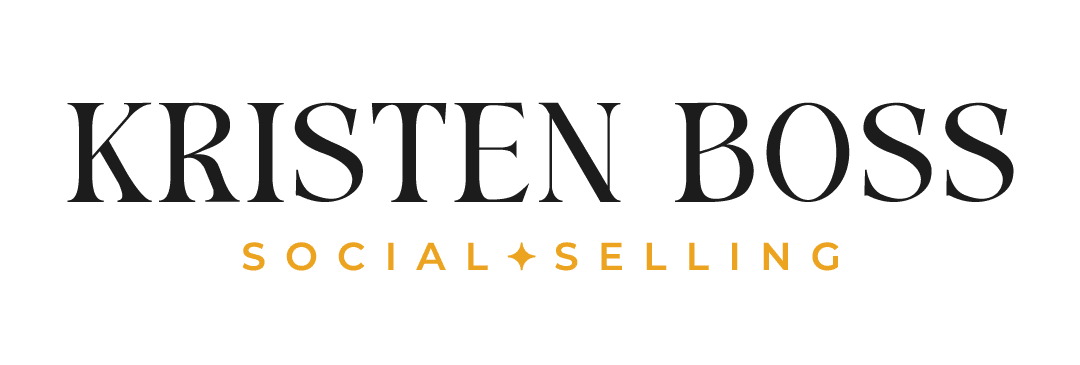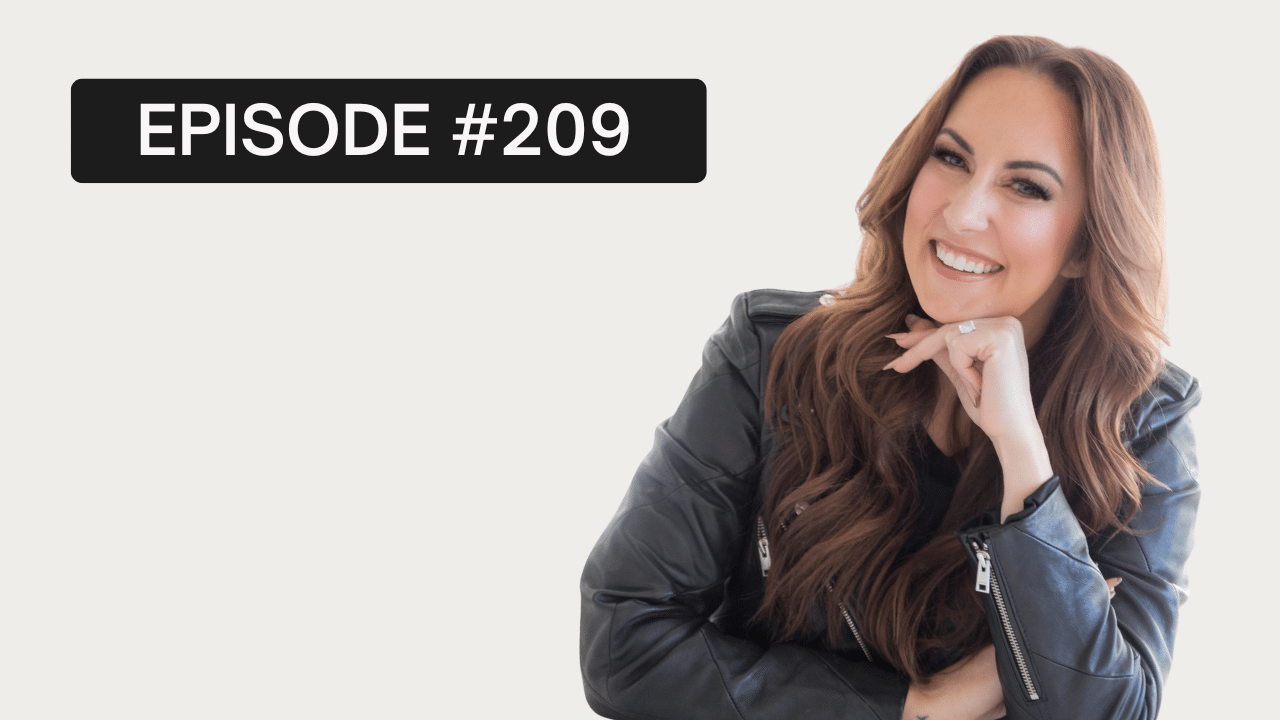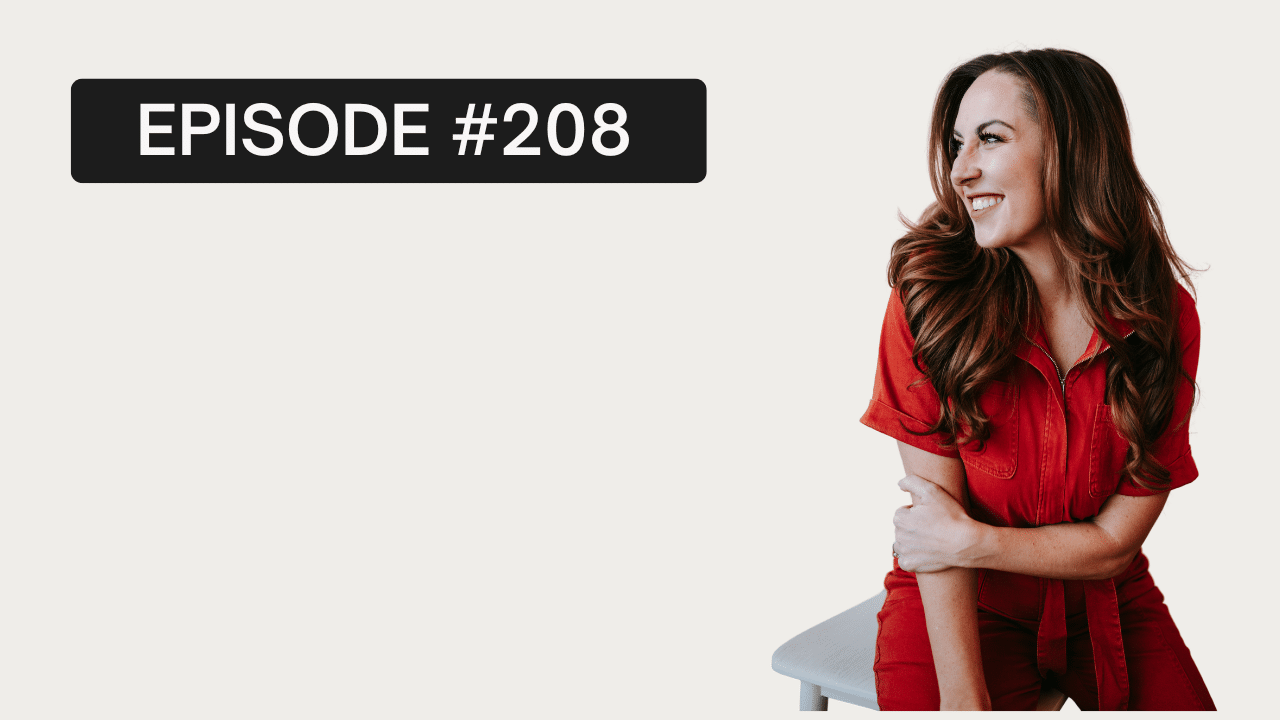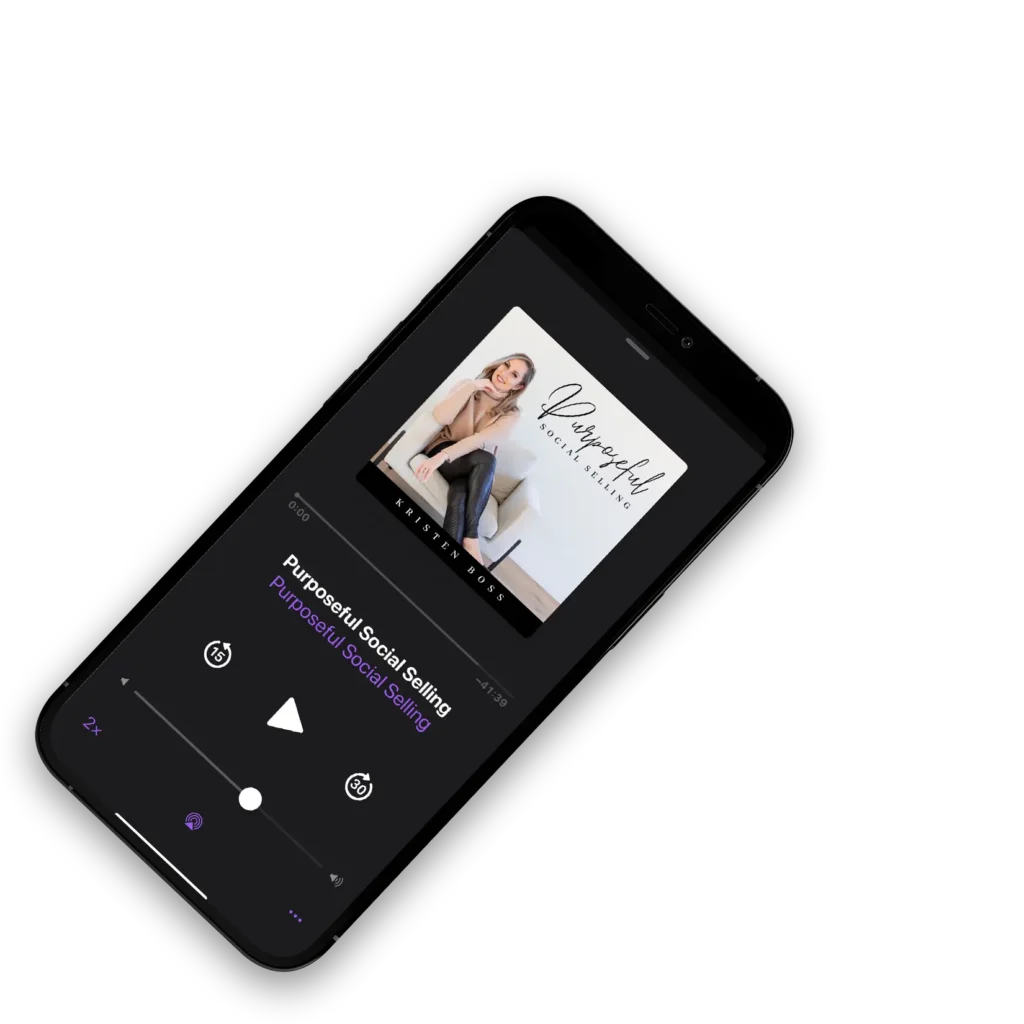Three years ago, if someone had told Kristen she would be able to take a break and go on a summer sabbatical, she would have dismissed the idea immediately. But this year, she decided to embark on a journey of rejuvenation and self-discovery during a summer sabbatical. What she learned during this time has been truly transformative, and today she is eager to share her experiences and insights with you.
Let’s look at a few highlights:
- Why do we fear judgment when announcing our need for rest?
- The vital importance of taking a pause when burnout sets in. We often push through, grinding without considering the consequences. But pushing through comes at a price.
- What are the systems and structures that can be put in place to help your business run smoothly when you step away.
- Why rest is the key ingredient for creativity.
Kristen is committed to sharing her experiences and advocating for the benefits of rest and play. She carries a newfound appreciation for rest and the strength it brings. She hopes her journey serves as a reminder to prioritize self-care and embrace the power of rest.
Remember, it’s okay to step back, refill your cup, and return stronger and more inspired than ever before. Let’s lead with intention, creativity, and a profound understanding of the value of rest in our lives. It’s incredible how stepping back can lead to fresh perspectives and renewed inspiration.
Discover what it takes to build, grow, and lead a team with The 5-Day Leadership Training. This 5-Day training will be packed with high-value content that will transform your idea of what it means to be a leader with strategies, tools, and expert guidance. Join Kristen August 14-18th for 5 days of training that will show you what it means to be a leader. Reserve your spot here.
Introducing the Social Selling Leadership School: A 12-week Advanced Leadership Certification program for Network Marketers. This program was designed to give you everything you need to be a confident and transformational coach for the people you serve and help your team get massive results. This is the ONLY Coaching Certification program built specifically for the social selling market. Find out more and join the waitlist here!.
Thanks for listening! Do you have a question about network marketing? Kristen can help! Drop your question here, and she just might answer it live on the podcast: https:/Kristenboss.com/question
If you’re ready to learn the simple process of running your social selling business online, you have to check out Kristen’s live group coaching program! The Social Selling Academy: www.thesocialsellingacademy.com
Transcript for Episode #175: Lessons from Sabbatical
Kristen Boss (00:19): You are listening to the Kristen Bos podcast. I’m your host, Kristen Boss. As a bestselling author and performance coach, I’m on a mission to share about sustainable and purposeful approaches to both business and life. Each week I bring relevant topics that I believe are necessary to create a life of purpose, significance and meaning. Entrepreneurship is about so much more than growing your bottom line. It’s about who you are becoming in the process and building a life that is truly extraordinary. Entrepreneurship is really just the beginning.
Kristen Boss (00:56): Hey, bosses. I am back with an all new episode after what I feel is a long awaited break. I think it’s been about seven weeks since I dropped a new podcast episode, and I will say that was my first seven week break, my first extended break, taking any type of break from the podcast in the three years since I have started it. So I’m really proud of that. I’m really proud of all that consistency and that I was able to bring back some of my favorite episodes for you to enjoy. So I hope you did. It feels amazing to be back. It feels so refreshing. I’ve, man, I feel like my cup is full and I’m ready to just bring so much to you all. So before I get into that, before I get into sharing the lessons I learned on my sabbatical, which was seven weeks long, it was amazing.
Kristen Boss (01:46): Before I get into sharing that with you, I want to share with you something that’s very exciting, that’s new that I have created for you. And it is a brand new five day leadership training. That’s what we’re calling it. It’s called the five Day Leadership Training. And if you’re like, wait, is this the Rising Leader Summit? Is this social Sound leadership school? What is this? Let me tell you, is a five day training I have created for network marketers specifically around the areas of leadership. So even if you don’t have a team or if you have a team of a thousand, or if you feel like a worthy leader, a non worthy leader, a qualified leader, or an unqualified leader, it is for you if you desire to have long-term success in the network marketing business model. Because here’s the thing in the network marketing business model, because chances are if you’re listening to this podcast, you are in that industry.
Kristen Boss (02:35): If you’re not, this will still benefit you. But chances are, if you want to play the long game in network marketing, you have to learn how to lead, coach, develop and train people, period. If you don’t know how to help other people get results and hit their goals, you’re just an affiliate marketer. You’re just someone slinging links and eventually you’re going to hit your income threshold because what you’re not doing is you’re not learning to leverage a team. You’re not learning to leverage others in a way that serves them and you. So this is where I noticed the rub for a lot of network marketers. They are great at moving a product, but they’re not great at moving people or they’re great at bringing people into their organization, but they notice that they’re quickly, they have a high turnover rate with people that are coming onto their team and quitting in 30 days, 60 days quitting before.
Kristen Boss (03:29): And there’s nothing more frustrating. I hear this from leaders all the time. There’s nothing more frustrating than seeing somebody with all the potential coming in and then either getting a false start, super excited, they work the business and then they decide, Nope, it’s too much for me. I don’t want it. And they quit. And you’re like, all that potential, they’re just walking away. Or somebody who quits before they even see their first win, before they hit a goal, they give up too fast. Or someone that comes in and they’re all excited, you give them the plan and then nothing, they ghost you. You don’t know what went wrong. And this happens with so many people. They’re like, I don’t get it. I bring people in, I train them, I tell ’em what to do. Why aren’t they taking the action in the five day leadership training, I’m going to teach you exactly how to get your team results faster, reduce the churn and burn that you might be experiencing.
Kristen Boss (04:16): Because listen, if you don’t know how to train and develop and lead people well, you’re going to be constantly replacing people and never actually getting forward momentum in your organization. And that’s when I see people getting frustrated. That’s when I see them burning out. That’s when I see them walking away and saying, this business isn’t for me, or It’s too hard. Or they look elsewhere where the grass looks greener and be like, maybe it’d be easier to lead over there. Leadership always starts with you. It’s always with you. So if you want to help people see wins faster and you want to help your team get fresh momentum, fresh wind in their sails, listen, I realize that we’re getting upon when you’re hearing this episode, we’re getting upon the school year starting. You’re probably buying the school books, buying the back to school clothes and all of those things.
Kristen Boss (05:02): So you’re getting ready. I know it’s a crazy busy time, but listen, I know every year around Labor Day is usually when someone’s team starts to say, okay, now that the kids are back in school, I’m ready to get back to work again. I’m ready to hit my goals. You need to be ready to lead your team. When they say I’m ready. You need to be able to activate your team when it’s time. So this is the perfect timing for you. So you’re like, what’s the details? It’s August 14th to the 18th. It’s an hour each day. It’s at noon central time. We are going to provide replays until August 26th. So for a full week after the training, we’re going to have replays up in the group. If you are in the S Ss a, this is totally separate from the Social selling academy. This is an introductory course to leadership.
Kristen Boss (05:48): So if you went to Rising Leader Summit but you didn’t do social selling leadership school still come to this, it will still be a huge benefit to you if you have people on your team where you’re like, wow, I really think she has leadership potential, but she gets caught up in her mind. Invite your friends, bring your people. Even if you don’t have anyone on your team, chances are you’re not attracting people into your organization because you don’t see yourself as a leader because you don’t actually believe yourself as somebody who is capable of helping somebody else have results and have success. So go to the link in the show notes, be sure to grab your ticket, be there. It’s going to be incredible, and I’m really excited for the concepts I’m going to be teaching you. If you’re on the fence about social selling leadership school, you need to be at this training because it’ll also help you decide if that’s the next right step for you.
Kristen Boss (06:33): It’s going to be highly valuable, value packed. I always say it’s going to be a fire hose of value, so be sure to be there. Share the link with your team, get your people there. Alright, let’s now talk about what I learned on sabbatical. So before I will say this, I had some people that were like, first of all, how did you even take a sabbatical? How is that even possible? And if you had asked me a year ago, if I could step away from my business for seven weeks, I would’ve said, that’s not even humanly possible. But I remember sitting with just asking myself the question, but what if I could make it possible? What might I need to do in my business in order to position it to that place where I can step away for seven weeks and my students still get results and them still have amazing fulfillment and have a well-oiled machine that still runs even while I’m gone?
Kristen Boss (07:24): And for me, I just started working on my team. And it’s funny, you’d be like, wait, you have a team? Yes, I have a team of 20 people where I train them, where we are very clear on our company culture, on how we treat our students, on how we fulfill. We are very meticulous with our systems, with our tech automation, the people I have hired and brought into the organization and vetting them properly and training them and all of those things. This has been a long time coming. I was telling my operations manager, Christina, I’m going to bring her on the podcast because her story is actually pretty incredible because she started with me as my virtual assistant. And just her story of her growth within my company is really inspiring. So I’ll bring her on sometime, but Christina, my ops manager, we have talked about, wow, this is four years in the making of how hard we’ve been working on systems and culture and hiring the right people and just doing all of that work and making sure that everything was in place.
Kristen Boss (08:27): Sometimes asking the question if I were gone, what would need to be in place is the most valuable thing you can ask yourself. Because a lot of you tend to get confused around the term systems like, well, how will I know when I need systems? What exactly are systems is that for? If I have a very large organization or a large team? And systems can start with as simple as the individual level. Do you have a system in place when you onboard somebody, when somebody joins you as a customer, is there a system you work them through, like a standard procedure you bring every customer through where you subscribe them to a text campaign, you add them to your email list and you add them to your Facebook group. That is a system where it’s like, okay, what is the goal of the system? And the goal of a system is always to facilitate a journey for someone who is in your organization as a customer.
Kristen Boss (09:13): So you’re like, okay, how is my system going to fulfill this? At what point do I need to send a text? At what point do we need to send an email? At what point are they in a group? Is there a video for them to watch? It’s so funny, I just remember years ago, I would tell you I’m not a systems person. And now I’m like, I love systems. I can coach somebody on systems all day. In fact, I coach a lot of other entrepreneurs just kind of as my volunteer work. I coach them on like, Hey, let’s clean this up because I love doing high performance executive coaching for people that run large companies to help them manage their time, have boundaries, protect their time and put in systems. And so for us, this has just been a focus for a long time. And a system is how things are running.
Kristen Boss (09:54): If you are not around a system is a form of automation. It’s essentially duplicating yourself through tech and other people and through systems. Systems is the secret to time freedom. And so I really think the sabbatical is evidence of that. So I remember with my mastermind alumni, they’ve been with me for a while, and the little birdies are about to flee the nest and be like, bye little birdies. I’ve trained you well. But they asked me, they’re like, well, is it possible for me? I said, absolutely. And so what I had them do is like, okay, let’s write down everything that comes up. If I were to say, take six weeks away from your business, what would you need to do? And what’s interesting is I’ve done this with other mastermind members where they have been on maternity leave where I’m like, okay, let’s plan for you actually being gone for 12 weeks.
Kristen Boss (10:41): What do you foresee happening? And so we actually wrote everything down. They’re like, well, what about team trainings? Who’s going to handle customer care? Emails, text campaigns, automation? Who’s going to announce company corporate specials? Who’s going to announce sales? Who’s going to make sure team calls are still happening? All of those things. We just put it all down on paper and then we solve for, okay, and how does that happen? Who do we need to hire? What do we need to automate, put in a system? What do we need to delegate? Meaning give it to somebody else? And what do we need to outsource? Meaning who do I need to hire in order to get this done? And so it’s very possible, but sometimes we just have to sit with, okay, if it is possible, what would I need to put in place? And so for me, the purpose of the sabbatical was like, I was like, man, I’ve been creating for a long time and I just noticed I’m ready for a rest.
Kristen Boss (11:28): It’s time for me to gain some perspective and refill my cup. And I think it’s really important to distinguish between when you need a rest and when you’re in burnout. And I knew I was getting close to burnout, not because I think it’s important to say this, not because I was hustling, but because of the amount I was creating in a short period of time, and I knew that I needed to recharge my battery. When you stay in this work, you become very self-aware of your energy levels. So I was noticing, have you guys ever noticed the older your iPhone gets, the less time it actually holds a charge? So I noticed I would be really good about, I take weekends off. I have a lot of downtime, I do a lot of self-care. I make sure I get eight hours minimums of sleep. I drink my water.
Kristen Boss (12:17): So I have all of those foundations of self-care in place, but I was noticing it wasn’t my body or my mind wasn’t holding a charge for as long as it normally does. And that’s what I’m like, oh, I need an extended time to refill my cup, to refresh myself so that I can reenter this rejuvenated with a lot more energy. And so for me, I just notice what are my small subtle signs that if I don’t take time to recharge and refill my cup, what will happen? And I noticed for me is when I start to care less about things I really normally care about. And my team noticed it too, when I start saying, I don’t know, you just decide. I don’t even want to know. That’s when I knew. I’m like, Ooh, it’s time for me to go and recharge and rest because I’m depleted.
Kristen Boss (13:07): I’m tired. I have decision fatigue. And so for me, it wasn’t like, I hate this. This is bad. It was like, oh, it’s time to actually for me to refuel, step away, take some downtime so that I can reenter with renewed energy. There’s a difference. I think it’s important. There’s a difference between quitting because you are burnt out. And burnout in my mind is like, how do I describe it? Here’s how I’m going to describe it. It’s like in a workout when you feel your muscles start to give a little bit and you feel a little bit of pain. For example, when you’re weight training and you feel a little pain, and normally it’s supposed to be uncomfortable when you’re squatting, when you’re doing a bicep curl or whatever, it’s uncomfortable. But there’s a time when you notice, oh, I’m not supposed to feel this pain.
Kristen Boss (14:03): And listening to that pain and stopping so that you don’t injure yourself. And so it’s like, okay, ooh, normally I can do 12 reps, but I’m going to need to stop at six reps because what is happening in my knee right now isn’t good. So I’m going to pull myself out of this movement to protect myself from massive injury that’s going to put me out for months instead of like, Hey, I’ll take three days off my knee instead of accidentally injuring myself and being forced to take 3, 4, 5 months out of this. So I kind of view burnout, burnout as this burnout happens. When we notice the pain in our knee, so to speak, and we push through it, we’re like we grind through it, we push through it, we don’t honor it because we’re afraid of pulling back. We’re afraid that, oh my gosh, if I pull back, that’s missed productivity.
Kristen Boss (14:50): That’s a missed deadline. Scarcity can write the narrative there instead of, hold on. What could be the harm to myself if I push through this pain? Are we going to have diminished returns? And this is where we talk about the law of diminishing returns, where eventually you work so much that you’re, the value of your work starts to deplete. It’s no different. And so burnout happens when we’ve moved. We’ve pushed through the pain when our body is asking for a break for the sake of productivity, not realizing that what is actually happening is we’re getting less return on our work because the value is starting to suffer. The quality of the work is starting to suffer. And so for me, I noticed I was starting to feel the pain. I was like, Ooh, this is an indicator for me that if I push through this, the quality of the work is going to suffer.
Kristen Boss (15:39): The quality of the fulfillment is going to suffer. The quality of these things are going to suffer. And I never want to show up to my audience from that place. And so I was like, it’s time. It’s time for me to step away, get new perspective, get some clarity, fill my cup and reenter. And also, I don’t think we have enough content creators demonstrating this ever. I don’t know about you, but I watch thought leaders and content creators, and it looks like they never ever take breaks. It looks like they’re always on. They’re always creating, they’re always putting out content. And for me, it’s kind of exhausting to watch that. And then it becomes this impossible standard where it’s like, well, they’re always on and they’re always doing these things. So I’m like, what if I were to set an example of somebody who has a very large business and does very well, and they give themselves permission to step away from their business for a couple months, and that they prioritize rest and normalizing that?
Kristen Boss (16:34): And so I was like, you know what? I actually think people need to see this done, and I’m going to talk about it because here’s what I could have done. I could have not said anything to anyone that I was taking a sabbatical. I even thought about that. I even thought like, oh, I’m not going to announce that I’m taking a sabbatical. I don’t want people to think that. And then I noticed, I was like, it was because I feared judgment of like, oh, I don’t want people to think I’m not working hard. I don’t want people to think I was hustling. I don’t want people to think I was burning out all of these things that came up. And I was like, oh, this is so interesting. This is actually the exact reasons why I should share that I’m going on sabbatical. Because what if other people have this thought?
Kristen Boss (17:09): What if other people are watching me? Because if I didn’t share it, what you would’ve seen on social media is no difference because my team was just repurposing content. They were repurposing old reels. We were airing podcast episodes. People just would’ve noticed, oh, she’s just recycling a lot of her content, but that no one would’ve known. I actually was on a sabbatical and I realized that if I didn’t tell people I was taking a sabbatical, I would’ve been perpetuating the same image I see out there of looking like content creators never take a break. And I’m like, wait, wait. People need to see the power of a repurpose content. And this is, I believe, the reward of consistency long periods of time. When you’ve been consistent for four years and you’ve put out content five days a week for four years, guess what? You have built a vault of so much content and value for your audience to consume that if you were to leave, they wouldn’t notice because there’s still so much for them to absorb and read.
Kristen Boss (18:09): And also all of that. It’s like you’ve built the content library, and that is a reward of consistency. And when you have a content library, you’re able to recycle content. But if you are only writing one post a week, right, then you’re not going to build a large library. It’s going to take a lot longer for you to be able to get to that place. So this is also, I want to just encourage you like, Hey, this is a reward for consistency as well, is that you are able to step away. I was thinking of this example too is so I started a personal training journey, like a hardcore one, super serious, I don’t know. Oh gosh, where am I at in this journey? 14 weeks ago? And it’s been really amazing, and it’s going to be a podcast episode for another day because I’ve learned so much about myself, and I’ll talk about that and how I focused on that and my sabbatical.
Kristen Boss (19:02): But my trainer is like, he’s like the Hulk, and he has spent years building muscle years and years and years. So his body composition is almost all muscle. Well, because he’s put all that work, putting the muscle on his metabolic burn is insane. So he’s actually built muscle where he has the metabolic burn where he could go and eat an entire large 18 inch pizza and maybe gain a pound of water weight. Whereas if I were to do that, I would actually gain body fat. I can’t do that. Why? Because I haven’t earned, I don’t have the muscle built and stored. I have not created that metabolic burn in my body. I haven’t earned the ability to metabolize an 18 inch pizza he has. So it’s kind of like, I kind of view content that way as well. It’s like, listen, I’ve built all this muscle in creating content as I knock my microphone here.
Kristen Boss (20:01): Listen, I’ve built all this muscle with content. So yeah, I have the capacity and the ability to step away for seven weeks, and there’s enough content to keep people coming back. And it was interesting because my following, it kept growing. Even while I was gone, I would occasionally check in on my account just to see, and it’d be like a hundred new followers. I was like, how? This is amazing. So all that to say, this is part of the reward for consistency. So I solved for, I noticed, okay, I want the sabbatical. I solved for it. I strategized. I took the time, communicated with my team, put all the things in place, decided to be transparent about the sabbatical with my audience and with you so that you could hear a, it’s possible for you and that it’s normal and it’s healthy and it’s important, especially as somebody who is a content creator and constantly thinking about how do I need to put this out there?
Kristen Boss (20:54): What new thing does my audience need? So I will tell you, rest is absolutely key for creativity. If you are dried up, if you are out of creative ideas, it’s time for you to just take a step away. It might just be one weekend, it might just be 24 hours to allow yourself to be creative again. And I just noticed for me, over my sabbatical for the first, I think four weeks, I didn’t have much creativity, which tells me how badly I needed the mental rest, especially after developing the social selling leadership school, all the curriculum for that, launching that, running the live event and rerecording all of the social selling academy. There was an insane amount of things I was doing the six months prior to my sabbatical. So I just knew, that’s when I knew on my sabbatical when I was about four weeks in, and my brain was like, Nope, got nothing.
Kristen Boss (21:47): I was like, wow, we really needed this sabbatical. And then I think it was about week five, maybe week six, where my brain was like, all right, I’m ready to start problem solving. I’m ready to start thinking about new trainings, new ways to reach people, new ways to serve people. And I started, and it felt light. It felt fun. It felt refreshing, it felt energizing. I felt excited and ready to contribute. I cared all the things. I was like, great. I honored the pain. I was feeling of like, whoa, okay, if I go further, I will hit burnout and it will cause harm to myself, or it will diminish the returns. The quality of work will suffer. So honored that did my sabbatical. And lemme just tell you a little bit about the sabbatical itself. It was amazing. We have a place in Breckenridge, Colorado, which is a really beautiful ski town.
Kristen Boss (22:36): And if you’re there in the winter, yeah, it’s a ski town, but in the summer it is so beautiful. It feels like, I think it looks like the Swiss Alps. It’s so stunning. It’s green. There’s lush meadows and wild flowers everywhere. So every day we were outside with the kids going hiking, doing bike rides. And so while I was, it was interesting at first I was genuinely worried about myself being on the sabbatical. I’m like, oh my gosh, I’m going to freak out about a week into this. I’m going to be bored if I’m not thinking about my business. And I even told my therapist, I was like, Hey, I need you on call in case I have an identity crisis because I’m not creating things and performing and doing all these things and not getting my dopamine from my business, so I’m going to need you to be there for me.
Kristen Boss (23:24): And we had a couple conversations and it was really good. But one of the things I decided to really focus on all summer was my wellness. And I told my trainers like, listen, my calendar’s pretty wide open for the next six weeks, so whatever you want to throw at me for my wellness, let’s do it. And so I did, I think between 15 and 18,000 steps a day. I think I walked over 300 miles total. I averaged eight miles a day walking at one point. I was taking up some salt baths all the time, but I was outside all the time. And I was doing this at nearly 10,000 feet elevation and weight training four days a week and drinking my water, focusing on my nutrition. And I will tell you, I went on a healing journey with myself with just connecting with my body, for lack of a better term, getting outside, getting in the sun, getting fresh air.
Kristen Boss (24:23): And I didn’t listen, I’m going to say this. This is pretty significant for me. I didn’t listen to a single personal development podcast over my sabbatical. I let my mind rest in the sense that, because for me, sometimes if I listen to a, what do I want to call it, self-help, high performance type of podcast, I’m writing notes. I’m like, suddenly I go into business mode. And for me, I was like, no, we’re not going to do that. So I read murder mysteries. I read, I downloaded audiobooks, and I listened to Harry Potter on my walks. And that’s what I’m doing right now. I still do my steps every day. And I am listening to Harry Potter audiobooks, and I am just so delighted. And you can see me. If you were to see me walking by, you’d probably see me laughing or smiling at something in the story, something that Ron Weasley says, or Hagrid, I don’t even know.
Kristen Boss (25:16): It’s just been so delightful. And so, yeah, I listened to Harry Potter and read books. And man, I slept so hard because I pushed my body so hard every day. Not in an exhausting way, but I was out. I was walking. Listen, eight miles a day and weight training, you sleep real good. So yeah, it was amazing. And just learning more about myself and giving myself permission to focus all in on my health, to let go of my, I can have a really successful business or I can have my health story, and I’ll talk about that more as I share about just how this fitness journey has really shaped me. Because I will tell you, I’ve done, I think I have a podcast episode in the past where I called it the 90 day agreement, and I did a 90 day agreement to wait train and all that for 90 days, and I did it.
Kristen Boss (26:13): But here’s the thing. I think this is similar with our business, and this is my challenge for you, is the reason I was like, why didn’t I stick with it? Because I made a 90 day agreement. I didn’t make an identity shift. I didn’t make a lifetime agreement with myself of like, this is who I am now. I will always be doing this. And so as soon as 90 days was done, there was no contract there in my mind, holding me to those actions. And so with this particular journey, I am working with my coach for a year. And with this particular journey, it’s been different. And I’ve been telling myself every day, I am doing weight training for the rest of my life. I’m doing weight training so that I can get up from the toilet when I’m 70 years old so that I won’t be in a wheelchair so that I’ll be strong so that I can chase my grandkids.
Kristen Boss (27:07): And just like this is who I am now. Every day, every day I’m like, this is who I am now. This is what I do. This is what I do. To the point where when I was thinking, oh, how long have I been doing this? It got to the point where I stopped counting the weeks because I’m like, why am I counting the weeks I’m doing this for the rest of my life? And then there’s been a lot I’ve learned in the process, and I’ll share my results on a separate episode because that’s for another time. But in the sabbatical, it was so good for me to just get in the sun walk, drink water, read books, listen to Harry Potter, laugh with my kids. My daughter would pick wild flowers on every walk and every walk I got back from, I would have a handful of the most beautiful mountain wild flowers.
Kristen Boss (27:54): And I had meaningful conversations with my kids and my husband, and we laughed, and it was so good. My soul was very, very refreshed at the end of it, to the point where when I came back, I’m like, I am so ready to come back. I come back from excitement, not like, oh, I have this big daunting business to come back to. And here’s the thing, we rest. I think this is the lesson I really want you to take away from this is we rest so that we can reengage as our healthiest most whole self. We don’t rest so that we quit and we’re exhausted and we come back with resentment. We rest so that we can recharge and reengage. Remind yourself of that. So I think quitting is when we were just like, we’re done. I don’t, I’ll reengage when I feel like it.
Kristen Boss (28:43): I’ll reengage when their circumstances become dire enough. No, no, no rest from a proactive place, rest from an abundant place, rest from an intentional place, rest from a place of like, okay, I’m doing this. Why am I doing this? I’m stepping away to refill my cup, recharge, get more ideas, be more creative, and to serve my audience better. When you understand the reasons why you’re resting, it helps you honor the experience so much more. And so I wasn’t guilting myself when I wasn’t sitting down and brainstorming and strategizing and no, I just kind of let my mind play and wander and rest. And if you haven’t read the book, essentialism by Greg McEwen, he talks about one of the things that helps the mind come up with good ideas is letting yourself have fun. And that’s my last point I want to leave you with is get a hobby.
Kristen Boss (29:37): If you don’t have a hobby, I can’t tell you how important it’s for you to have something you enjoy outside of your business. And for my type three overachievers like me, it can be very hard because it’s very easy to be like, well, my business is my hobby. But that’s when I realized me walking outside every day kind of became, it felt like a hobby. Fitness started to become a hobby for me in a way that allowed my mind to just wander and just play and have good ideas. And so hobbies is where our brain goes to rest and come up with good ideas. And good ideas always come when we’re not trying to force it. So the value of a hobby, the value of doing things for the joy and pleasure of it, not because you’re trying to achieve something, accomplish something, win at something or get recognition is so valuable.
Kristen Boss (30:32): And it was good for me. It was so good for me in the sabbatical to just be Kristen. No one knows who I am. It’s great not getting accolades. It was nice. And so it was a moment for me to remind myself like, let’s just get back in touch with Kristen, not Kristen who has the podcast, not Kristen, who speaks on stages, not that, Kristen, and let’s get to know myself on that level. And it was just really amazing. So I just wanted to share a little bit about that experience with you and just share with you about how beneficial rest and play is to your long-term productivity and performance. It is vital. So friends, I’m so glad to be back, so glad to serve you. Don’t forget to register for the five day leadership training. Grab the ticket in the show notes, and we will see you in the next episode. That’s a wrap for today’s episode. Listen, if you love what you heard here today, I would love for you to leave a real quick rating and a review. This helps the show get discovered by new people. Be sure to take a screenshot of today’s episode and shout us out on Instagram. We’ll shout you right back out. If you’d like to find additional resources or discover how to work with me, head to kristenboss.com.
